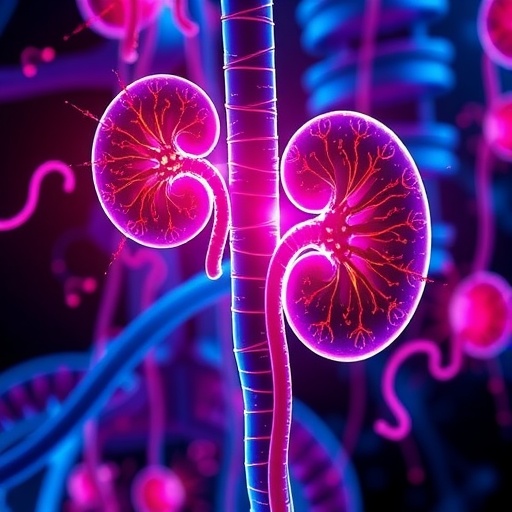
Acute kidney injury (AKI) persists as a formidable clinical challenge worldwide, exacting a heavy toll in terms of morbidity, mortality, and long-term healthcare costs. Despite advances in critical care and nephrology, effective therapeutic strategies that can halt or reverse the progression of AKI remain scarce. Mounting evidence now spotlights mitochondrial biogenesis—the process by which cells generate new mitochondria—as a pivotal mechanism that could offer a transformative approach to AKI treatment. This cellular program, vital for maintaining energy homeostasis and resilience against stress, is emerging as a target to restore kidney function and promote recovery following injury.
Kidneys are among the most metabolically demanding organs, consuming large quantities of ATP to maintain solute transport and filtration functions. Within the kidney, the tubular epithelial cells are especially reliant on mitochondrial efficiency. During episodes of AKI, insult-induced mitochondrial dysfunction results in a cascade of detrimental events, including loss of ATP production, accumulation of reactive oxygen species (ROS), initiation of cell death pathways, and inflammation. This mitochondrial impairment exacerbates tissue injury and compromises renal recovery, underscoring the importance of mitochondrial health in the pathophysiology of AKI.
Mitochondrial biogenesis (MB) is orchestrated by a sophisticated network of transcription factors and signaling pathways that coordinate mitochondrial DNA replication, protein synthesis, and organelle assembly. Among these, peroxisome proliferator-activated receptor gamma coactivator-1 alpha (PGC-1α) stands as the master regulator, integrating environmental cues such as energy demand, oxidative stress, and hypoxic conditions to drive mitochondrial proliferation. Activation of PGC-1α enhances the expression of nuclear respiratory factors and mitochondrial transcription factor A, components essential for mitochondrial genome maintenance and biogenesis. Through these mechanisms, PGC-1α potentiates cellular energy generation and adaptive stress responses that are critical for renal cell survival during AKI.
.adsslot_ge3SYBk1Fl{width:728px !important;height:90px !important;}
@media(max-width:1199px){ .adsslot_ge3SYBk1Fl{width:468px !important;height:60px !important;}
}
@media(max-width:767px){ .adsslot_ge3SYBk1Fl{width:320px !important;height:50px !important;}
}
ADVERTISEMENT
Experimental models of AKI have demonstrated that downregulation of PGC-1α and attenuated MB coincide with worse outcomes, while pharmacological or genetic upregulation of PGC-1α confers cellular protection and promotes functional recovery. Compounds such as resveratrol activate PGC-1α via SIRT1-mediated deacetylation, restoring mitochondrial function and reducing oxidative damage. Similarly, small molecules like ZLN005 stimulate PGC-1α expression through AMP-activated protein kinase (AMPK) pathways, while pyrroloquinoline quinone (PQQ) promotes CREB phosphorylation, indirectly augmenting MB. These agents exemplify the therapeutic potential of targeting MB-related pathways to counteract mitochondrial dysfunction in AKI.
Nevertheless, the regulation of MB requires exquisite balance. Excessive or aberrant activation may provoke unintended repercussions, including protein misfolding, mitochondrial stress, and cellular toxicity. Such risks emphasize the necessity for finely tuned therapeutic modulation, ensuring that MB enhancement is sufficient to restore metabolic competence without precipitating deleterious effects. Current research is intensively focused on delineating the molecular crosstalk and feedback mechanisms governing MB to identify optimal intervention points and dosage strategies.
Beyond pharmacological agents, cutting-edge nanotechnology is being harnessed to develop mitochondria-targeted drug delivery systems. These nanocarriers are engineered to selectively amplify mitochondrial uptake of therapeutic compounds, improving bioavailability and reducing systemic toxicity. Such precision medicine approaches hold promise in overcoming longstanding challenges related to drug specificity and off-target effects, potentially revolutionizing AKI management by delivering mitochondrial modulators directly to damaged renal cells.
Translating these mechanistic insights into clinical therapies demands a personalized framework, acknowledging the diverse etiologies and subtypes of AKI, ranging from ischemia-reperfusion injury and nephrotoxicity to sepsis-associated renal impairment. Patient-specific factors, including underlying comorbidities such as diabetes and cardiovascular disease, further complicate therapeutic response profiles. Integration of high-dimensional multi-omics data—encompassing genomics, transcriptomics, proteomics, and metabolomics—is anticipated to identify predictive biomarkers that stratify patients likely to benefit from mitochondrial biogenesis-targeted interventions, thereby enhancing treatment precision.
The therapeutic landscape is further enriched by advancements in gene editing and stem cell technologies that may complement MB restoration efforts. For instance, manipulating key regulators of mitochondrial function through CRISPR/Cas9-mediated gene editing or bolstering mitochondrial capacity via stem cell-derived exosomes could provide synergistic avenues for renal regeneration. Such combinatorial strategies may address the multifaceted nature of mitochondrial dysfunction in AKI more comprehensively.
While challenges remain, including elucidating long-term safety profiles and optimal timing of MB-targeted therapies, the burgeoning field presents compelling evidence that harnessing mitochondrial biogenesis can mitigate AKI severity, expedite renal recovery, and potentially avert progression to chronic kidney disease. This paradigm shift aligns therapeutic focus squarely on restoring cellular bioenergetics and resilience at the organelle level, marking a new frontier in nephrology.
As clinical trials exploring MB-enhancing agents and delivery systems gain traction, the integration of mitochondrial health biomarkers into diagnostic protocols will be crucial. Real-time monitoring of mitochondrial dynamics may guide therapeutic adjustments, ensuring dose optimization and minimizing adverse effects. This convergence of basic science and clinical application reflects an era where precision mitochondrial medicine could become central to combatting AKI.
In conclusion, targeting mitochondrial biogenesis embodies a promising, mechanistically grounded approach to address the unmet clinical needs in acute kidney injury. By revitalizing mitochondrial function and energy metabolism, these strategies offer a beacon of hope for improving patient outcomes in a domain where current options remain limited. Continued interdisciplinary research and translational efforts will be indispensable for actualizing the potential of mitochondrial therapeutics, ushering in an era of innovative and effective renal care.
Subject of Research: Mitochondrial biogenesis as a therapeutic target in acute kidney injury (AKI)
Article Title: Harnessing mitochondrial biogenesis to combat acute kidney injury: Current insights and future directions
News Publication Date: 1-Nov-2025
References:
Yajie Hao, Fahui Chen, Xiya Ren, Xiu Huang, Xiaoshuang Zhou, Harnessing mitochondrial biogenesis to combat acute kidney injury: Current insights and future directions, Genes & Diseases, Volume 12, Issue 6, 2025, 101645, DOI: 10.1016/j.gendis.2025.101645
Image Credits: Genes & Diseases
Keywords: Acute kidney injury, mitochondrial biogenesis, PGC-1α, mitochondrial function, oxidative stress, renal recovery, energy metabolism, AMPK, SIRT1, nanotechnology, targeted drug delivery, precision medicine
Tags: ATP production in kidney cellscellular stress response in kidneysenergy homeostasis in renal cellsinflammation and kidney injurymitochondria and kidney functionmitochondrial biogenesis in acute kidney injurymitochondrial dysfunction and renal recoverynephrology advancements in AKI treatmentrestoring kidney function through mitochondrial healthrole of reactive oxygen species in AKItherapeutic strategies for AKItranscription factors in mitochondrial biogenesis





